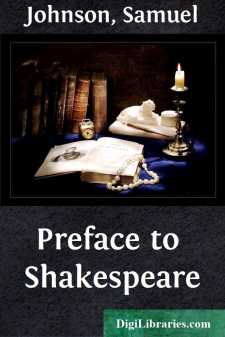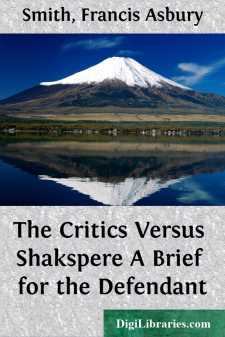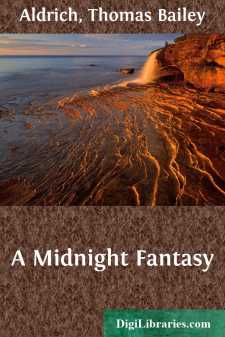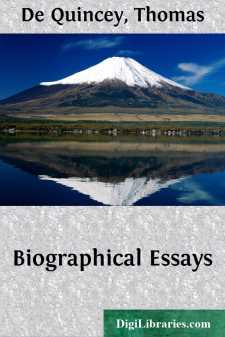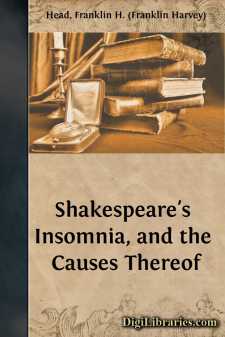Literary Criticism
- American 18
- Ancient and Classical 3
- Asian 1
- Australian & Oceanian 1
- Books & Reading 8
- Caribbean & Latin American 2
- Drama 2
- English, Irish, Scottish, Welsh 49
- European 7
- General 37
- Horror 1
- Humor 2
- Jewish 2
- Medieval 2
- Middle Eastern 3
- Poetry 7
- Renaissance 6
- Russian & Former Soviet Union 1
- Shakespeare
Shakespeare Books
Sort by:
by:
Samuel Johnson
PREFACE TO SHAKESPEARE That praises are without reason lavished on the dead, and that the honours due only to excellence are paid to antiquity, is a complaint likely to be always continued by those, who, being able to add nothing to truth, hope for eminence from the heresies of paradox; or those, who, being forced by disappointment upon consolatory expedients, are willing to hope from posterity what...
more...
§ 1. THE MAIN (SENTIMENTAL) PLOT OF THE FOUR LOVERS AND THE COURT OF THESEUS "And out of olde bokes, in good feith, Cometh al this newe science that men lere." Chaucer. As the play opens with speeches of Theseus and Hippolyta, it is convenient to treat first of these two characters. Mr. E.K. Chambers has collected (in Appendix D to his edition) nine passages from North's Plutarch's...
more...
INTRODUCTION. When a small impression of these quaint old books issued from the Chiswick Press, many years ago, under the auspices of the late Mr. S. W. Singer, that gentleman merely designed the copies struck off for presentation to a select circle of literary friends who, like himself, felt a warm interest in every relic of the past which helped to illustrate Shakespeare and ancient English manners....
more...
Many years ago, I was retained in the great case of The Critics against Shakspere, the most celebrated on the calendar of history during three centuries. Unlike other cases, it has been repeatedly decided, and as often reopened and reheard before the most eminent judges, who have again and again non-suited the plaintiffs. Appeals have availed nothing to reverse those decisions. New actions have been...
more...
It was close upon eleven o'clock when I stepped out of the rear vestibule of the Boston Theatre, and, passing through the narrow court that leads to West Street, struck across the Common diagonally. Indeed, as I set foot on the Tremont Street mall, I heard the Old South drowsily sounding the hour. It was a tranquil June night, with no moon, but clusters of sensitive stars that seemed to shiver...
more...
by:
William Hazlitt
The book here included among The World's Classics made its first appearance as an octavo volume of xxiv + 352 pages, with the title- page: Characters of Shakespeare's Plays, By William Hazlitt. London:Printed by C. H. Reynell, 21 Piccadilly, 1817. William Hazlitt (1778-1830) came of an Irish Protestant stock, and of a branch of it transplanted in the reign of George I from the county of...
more...
SHAKSPEARE.[Endnote: 1] William Shakspeare, the protagonist on the great arena of modern poetry, and the glory of the human intellect, was born at Stratford-upon-Avon, in the county of Warwick, in the year 1564, and upon some day, not precisely ascertained, in the month of April. It is certain that he was baptized on the 25th; and from that fact, combined with some shadow of a tradition, Malone has...
more...
by:
Arthur Acheson
CHAPTER I INTRODUCTORY The most interesting and important fifteen years in the records of English dramatic literature are undoubtedly those between 1588 and 1603, within which limit all of Shakespeare's poems and the majority of his plays were written; yet no exhaustive English history, intelligently co-ordinating the social, literary, and political life of this period, has ever been written....
more...
I. Insomnia, the lack of "tired Nature's sweet restorer," is rapidly becoming the chronic terror of all men of active life who have passed the age of thirty-five or forty years. In early life, while yet he "wears the rose of youth upon him," man rarely, except in sickness, knows the want of sound, undreaming sleep. But as early manhood is left behind and the cares and perplexities...
more...
The plays known as Shakespeare's are at the present time universally acknowledged to be the "Greatest birth of time," the grandest production of the human mind. Their author also is generally recognised as the greatest genius of all the ages. The more the marvellous plays are studied, the more wonderful they are seen to be. Classical scholars are amazed at the prodigious amount of...
more...


